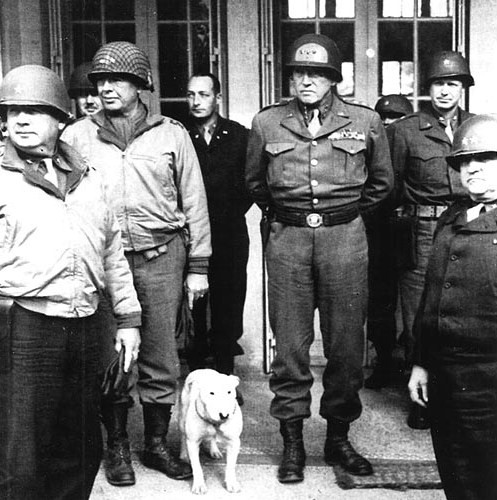This is somewhat depressing/alarming.
Unrecognized Iwo Jima photo shows how World War II memories fading
Ron Grossman
Chicago Tribune
March 15, 2010
I took a quick survey in the newsroom the other day, something between a Rorschach test and a pop quiz, asking younger colleagues to identify an iconic photograph of World War II.
While some instantly recognized the image, others couldn't quite place it.
"I know I ought to know it," one co-worker said. "It was in the movie, ‘Flags of Our Fathers.' " Some, seeing uniforms, realized it must be a war photo. Maybe Vietnam? One got the era right but the battlefield wrong. She guessed it was D-Day, not, as it was, the raising of the American flag on Iwo Jima.
Journalists are probably more attuned to history than many people. We stick bits of it into the third or fourth paragraph of a story as background to the day's events. But non-journalists have less incentive to keep up with the past, apparently not even the lure of good grades. Nearly a quarter of 17-year-olds recently surveyed by Common Core, an educational advocacy group and think tank, couldn't identify Adolf Hitler.
I don't cite those statistics to criticize young people but to alert them to a quandary they will face some day: Your historical tape measure won't be automatically adopted by your children.
For many of us who remember World War II, it was the biggest event of our lifetime, not just in magnitude but rectitude. It was a morality play, lacking shades of gray or traces of ambiguity. Americans took lives, but they did so in order to stop the slaughter of millions.
That kind of unshakable conviction about who was Right and who was Wrong obviously depends upon knowing the combatants. If you can't identify Hitler, you're not likely to grasp the enormity of his crimes.
This year marks the 65th anniversary of the end of World War II. As the calendar of the final battles rolls by — Iwo Jima recently and soon Berlin and Okinawa — there will be newspaper and TV coverage. Surviving veterans will be interviewed, returning the war to public consciousness.
Yet that can only postpone the inexorable erosion of that intersection of memory and emotion with which we mark the sliver of history we inhabit. Some of our mental signposts are profound, others mundane. We recall exactly where we were when we heard the news that John F. Kennedy and Robert Kennedy and Martin Luther King Jr. were assassinated. We remember how our hearts beat faster the first time we heard The Beatles or Frank Sinatra or saw Willie Mays shag a fly ball in deep center field.
My own understanding of World War II is welded to memory flashes of my parents doing the dinner dishes. The radio was on, ears were then trained to listen for the words, "We interrupt this broadcast for a bulletin," followed by news of battlefield victory or defeat. My mother would wash cups and plates and hand them to my father. Drying each with a dish towel, he'd return it to a cabinet shelf.
Memory is like that. It has its own logic. It blends world-shaking events with those not preserved in history books but deeply inscribed in our psyche. I don't recall seeing a dish rack until I encountered one in the home of an art professor to whom I had emotionally apprenticed myself. He and his wife explained they left dishes to dry of their own accord. They called it "air-drying." The words seemed to separate the avant-garde from the bourgeois world I was eager to flee. The professor and his wife belonged to the Bauhaus movement, which preached that artists should use their talents to design utilitarian objects that would reduce the drudgery of household chores, freeing mankind for the finer things in life.
To me, that meant the dish towel had to go. When I got my own apartment, I bought a dish rack as evidence of my escape from the middle class. That purchase and World War II were my historical markers. Until, that is, I noticed a general decline of the dish towel. Air-drying became commonplace, followed by dishwashing machines — robbing me of a snobbish way to distinguish the before and after of my life.
Now, another marker feels endangered. If the dish towel set me apart, the sacredness of World War II bound me to others — whose ranks are patently diminishing. A few months ago, students at a high school in Chatham, Ill., painted a mural on a school wall. These young people recognized the iconic imagery of Iwo Jima. They borrowed it but replaced Old Glory with a windmill. Saving the environment from pollution was their crusade, they explained.
Most of the 236 comments on the local newspaper's Web site seemed divided between those who found the mural disrespectful of World War II veterans or those who believed it symbolized the freedom for which they had fought. One, though, reacted with a haunting forecast:
"One day down the road the wall will need to be repainted, and at that time some other artistic individual will paint something there, too. At that time, who knows, it could reference another historical event on another level … Each generation has its own battle."
Edit: Oops, re-post. Sorry.







